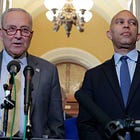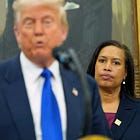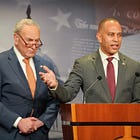Congress grows restless with Trump’s TikTok delays
Even with a U.S.-China framework in sight, members insist the president enforce the letter of the law.

👋🏾 Hi, hey, hello! Welcome back to Congress Nerd, the corner of Once Upon a Hill where I geek out over all the legislative twists and turns happening on Capitol Hill—and clue you in on how it affects your life and work in Trump 2.0. I scheduled this post to publish last night before I left the Capitol, but I closed my laptop before it could finish publishing because the draft was still on my screen when I opened it just now to start my day. It’s been that kind of week.
If you haven’t already, consider upgrading to a paid subscription to unlock multiple editions of my Congress Nerd column, filled with original reporting and sharp analysis straight from Capitol Hill, and delivered with an independent, brainy and accessible voice you won’t find anywhere else. These must-read dispatches are designed for political insiders and community leaders who need to stay ahead of the story and understand what the latest moves in Congress mean for real people, who are often left out of the conversation. Paid subscriptions ensure Once Upon a Hill remains uncorrupted by the corporate or billionaire influences that have captured so many other news outlets.
Now onto what was supposed to be last evening’s post…
While members of Congress were back home in their districts and states over the August recess, the White House launched an official @whitehouse TikTok account to push administration messaging to the app’s large U.S. audience, debuting with clips of President Donald Trump and a triumphant “We’re back” theme that cast his second term as a new golden age.
But the launch struck many lawmakers as peculiar.
Just 16 months earlier, Congress had passed a law with broad bipartisan support requiring ByteDance—TikTok’s China-based owner—to divest within nine months or face removal from U.S. app stores. The Supreme Court unanimously upheld the measure three days before Trump returned to the White House.
The law, which the Supreme Court unanimously upheld three days before Trump was sworn in, allowed a single 90-day extension if divestiture is clearly underway. Instead, Trump has ordered his Justice Department not to enforce it four times—most recently this week, extending the deadline to Dec. 16 while his administration pursues a framework deal with Beijing.
Even if TikTok ultimately remains accessible to millions of U.S. users, nearly a dozen lawmakers, some of whom use the app in personal or official capacities, voiced deep frustration that Trump has repeatedly failed to enforce the letter of the law.
“President Trump said he would solve this problem,” Sen. Cory Booker (D-N.J.) told me this week. “He’s said he would solve it before now, and he hasn’t done it, so he’s not living up to the expectations of the hundreds of millions of people that use that platform, or the tens of millions in our country alone. So again, I think that there should be a solution. And I think this is the time that we need presidential leadership, and right now, I have not seen it.”
House Minority Leader Hakeem Jeffries (D-N.Y.) struck a similar tone to reporters on Tuesday.
“I mean, the question here is at what point are we going to find a path forward so that divestiture, which was the main principle in the legislation that was passed by Congress over a year ago, can take place?” the top House Democrat said. “There is no interest in a TikTok ban, but there is interest in divestiture so that TikTok is not owned by the Chinese Communist Party, a strategic adversary of the United States of America.”
The U.S. and China announced on Monday in Madrid a framework agreement intended to address American national security concerns, particularly fears about Chinese influence, access to U.S. user data and the algorithmic recommendation systems.
An investor consortium led by Oracle, Silver Lake and Andreessen Horowitz is reportedly positioned to take about 80 percent ownership of TikTok’s U.S. operations. (Under the proposed ownership structure, a new U.S.-based entity would be established, while Chinese shareholders would retain the remainder stake.) Oracle is expected to manage all U.S. user data with servers and facilities in Texas.
Chinese negotiators had pushed for trade and tech-related concessions—from tariff reductions to easing of export controls—as part of any deal, but they dropped many of these demands under pressure from the threat of an outright ban.
Despite China describing the framework as a win-win, the agreement is still not finalized, and significant issues remain open and unresolved, including how much of the recommendation system, its training, or governance will still be under ByteDance and China’s influence. The handling of intellectual property is still under review, and what oversight mechanisms will exist isn’t concrete either. It’s also undetermined if the framework satisfies the statutory requirements under the divest-or-ban law, and skepticism exists that all the pieces can be implemented by the new mid-December deadline.
Trump, who plans to speak with Chinese President Xi Jinping on Friday, told reporters on separate occasions this week that the app’s popularity with young people was part of his motivation to close a deal.
“The kids want it so badly,” the president said. “I had parents calling me up. They say, ‘If I don’t get it done, they’re in big trouble with their kids.’ I think it’s great. I hate to see value like that thrown out the window.”
But Trump didn’t always share that view.
During his first term, Trump initially pushed aggressively for a sale of TikTok’s U.S. operations on national security grounds, but a deal never materialized. (He even publicly suggested the Treasury Department should get a portion of the sale in a comment that drew legal and political scrutiny.) The president signaled skepticism about forcing a sale early in his second term and suggested a ban might be simpler and more effective to avoid a compromise that would make him appear soft on China. But as this month’s statutory divestiture deadline and broader U.S.-China trade negotiations approached, Trump embraced the framework that allowed U.S. investors to take majority control while China retained some stake.
It is no surprise that Trump has since framed the emerging deal as a victory for his hardline posture, even though it’s closer to the bargain he resisted earlier.
But for some of the president’s fiercest critics, his failure to implement the law sooner reflects what they perceive as his flimsiness on other important issues.
“He also campaigned by saying he would lower the cost that people face and that the American family would see a benefit for it. We didn’t know that he was going to start with his family first,” House Democratic Caucus Chair Pete Aguilar (D-Calif.) told me last week. “That’s where we are, and his family continues to make money and grift off all of these products and all of these environments. I think that's what's unfortunate, specifically, when we talk about the social media landscape.”
Rep. Ami Bera (D-Calif.), a member of the House Intelligence Committee and the ranking member on the House Foreign Affairs subcommittee that oversees U.S. foreign policy toward China, called out Republicans for refusing to call out Trump for not enforcing the law, despite the drafting and passage of the divest-or-ban law being a bipartisan exercise.
“Nothing’s changed in how easy it is to manipulate elections and public opinion and so forth,” Bera told me. “But again, I don’t know what happened to my Republican colleagues.”
TikTok has over 170 million U.S. users and is the fastest-growing social app among Gen Z. Its recommendation engine shapes trends, music and consumer behavior. Its recommendation engine is credited with democratizing reach, empowering small creators to gain vitality without large followings—a critical distinction from competitors like Instagram and YouTube.
Creators also enjoy the app because they can begin with minimal production value and still find audiences, fueling an explosion of micro-influencers and niche communities. Many small businesses use TikTok as a primary marketing channel since viral clips can translate directly into sales without traditional ad spend, which explains why thousands of U.S. creators rely on TikTok as a primary or supplemental income source through TikTok’s Creator Fund/Creativity Program, livestream gifts and affiliate sales. A ban, advocacy groups argue, would jeopardize these livelihoods.
Still, the most pro-creator members, including Reps. Yvette Clarke (D-N.Y.) and Beth Van Duyne (R-Texas), who founded the bipartisan Congressional Creators Caucus this summer to elevate the voices of online content creators in tech policy debates, say the app’s upside must be weighed against the risks.
“I have a lot of concerns with the information that is being collected by the People’s Republic of China,“ Van Duyne told me. “While it's a great forum for these creators to put their content on, if it's a threat to national security, that needs to be taken into account.”
Clarke added that the U.S. government has failed to protect citizens from the harms of social media platforms and that if all else fails, American ingenuity will rise to the occasion.
“I tell people I’m old enough to remember that we had MySpace, right? And from MySpace, people migrated to Facebook, and from Facebook, so on,” she said. “It’s not as though [TikTok is] the only ticket in town. We’re so innovative in the United States that we can create other platforms that serve very similar purposes to what TikTok provides without the major risk.“
For Rep. Hillary Scholten (D-Mich.), the issue is about fairness, considering China doesn’t allow its citizens to freely use U.S. social media apps. (Access is heavily restricted and mostly replaced by domestic platforms aligned with state censorship rules.)
“It’s a simple reciprocal response. The same rules of the road that China has for us, we’re gonna have here,” Scholten told me this evening. “It’s critical for protecting our small businesses and protecting our kids, right? But we don't have to get rid of the entire platform. In fact, I think we should keep it, but let’s make it a great U.S.-owned company.”





